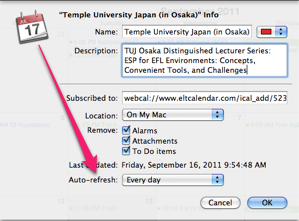Saitama JALT:
�Teaching English to Young Learners: Strengthening Teachers to Strengthen Students
Date: Sunday, August 29th, 2010 Time: 1:10 PM - 4:45 PM
Speaker: Junko Machida, Rumiko Kido, Aleda Krause
Description:
On Sunday, August 29, JALT Omiya will present a workshop for English educators of young learners. We are proud to have three noted speakers and authors share their methods and teaching ideas with us so that we can grow as educators.
* Junko Machida (ESTEEM) will demonstrate the use of global issues in the classroom to help with elementary school English lessons.
* Rumiko Kido (MPI) will explain the benefits of using phonics to help students acquire English language in an enjoyable way.
* Aleda Krause (JALT TCSIG) will explain and demonstrate five steps to assist children to go from listening to speaking.
Teaching English to Young Learners Through Global Education
by Junko Machida of the Elementary School Thematic English Education Movement (ESTEEM)
Junko Machida will discuss the benefits of a thematic English teaching approach focusing on global education, in which students learn to use the language as a meaningful tool and develop the knowledge, skills and attitudes needed to be responsible global citizens. Then through a mock lesson, Junko will demonstrate how she introduces global issues to elementary school students and helps them learn the English language at the same time. Workshop participants will be asked to play the part of the students during the mock lesson, and explore the theme-based teaching approach from teacher and learner perspectives.
Junko Machida is the founder and director of Elementary School Thematic English Education Movement (ESTEEM). Before she established ESTEEM in 2006, she worked for more than ten years as a researcher and creator of thematic English teaching materials with Globe International Teachers Circle (GITC). She has been invited to be a guest teacher and to speak on elementary school English education by various schools, organizations and study groups.
Phonics Activities for Fun
by Rumiko Kido of Matsuka Phonics Institute (MPI)
Phonics teaching is effective for teaching English to Japanese students because: a) The phonics method shows a consistency between English sounds and spelling. b) Students use only English letters to understand the system. Phonetic symbols and katakana are not used because they confuse the students. c) Phonics helps Japanese students to learn accurate pronunciation. d) Learning phonics helps students to become independent learners of English. Students learn more when they do fun activities than when they just listen to explanations. In this workshop, let's share phonics activities for fun.
Rumiko Kido is the Sales Division Manager for mpi inc., which is also known as Matsuka Phonics Institute. She also conducts teacher-training workshops. She has written mpi QA-100/200 communication workbook for junior high school students. Currently she is the head of WE CAN! sales and marketing. WE CAN! is the unique course book authored by Yoko Matsuka and published by McGraw-Hill. Ms. Kido received her B.A. in Comparative Cultures from Sophia University, Tokyo.
From listening to speaking
by Aleda Krause of the JALT Teaching Children SIG (JALT TCSIG)
Listening is the most important skill for children studying English in Japan. Active, participatory listening tasks to introduce and practice language are absolutely necessary, right from the first lesson. Many speaking activities follow naturally from listening activities. Author of SuperKids and SuperTots, Aleda will explain and demonstrate five steps from listening to speaking. Come prepared with clean ears and lots of energy, so you can go home with many ideas to help your students along the path from listening to speaking.
Aleda Krause is a teacher and teacher trainer who has worked with more than 250 groups of teachers all over the world for more than 30 years. She teaches students of all ages, from preschool to senior citizens, including university students learning to be teachers of children. She is the author of SuperKids, a 6-level EFL series for elementary-school children, SuperTots, a 3-level EFL series for kindergarteners, and the Longman Children's Picture Dictionary.
Organization: Saitama Chapter of the Japan Association for Language Teaching (Saitama JALT)
Cost: JALT Members: free
Non-members: 500 yen
Venue: 5th Floor, Sakuragi Kominkan, Shiino Omiya Center Plaza
Location: Saitama City, Saitama Prefecture, Japan
![]() Add this to iCal
Add this to iCal
![]() (Need help?)
(Need help?)
![]() Add to Outlook
Add to Outlook
![]() (Need help?)
(Need help?)
You can add this event to your iCal calendar.
- Click on the iCal icon. Your iCal software will start.
- Click 'Subscribe':

- Under 'Auto Refresh', select 'Every day' in case the the basic details change:

You can add this event to your Microsoft Outlook calendar.
- Click on the MS Outlook icon.
- See what happens.
- Tell us what happens. I don't have MS Outlook on a Windows computer, so I can't test it.
- If you click on the icon and nothing happens, do this:
- Right-click on the icon and save the file.
- According to Microsoft's support page, in Outlook's File menu, you should click Import and Export.
- Click to select Import an iCalendar or vCalendar file (*.vcs), and then click Next.
- Click to select the vCalendar file you've just saved, and then click Open.
Contact Saitama JALT
Website: http://www.saitamajalt.com
Email QR Code:





